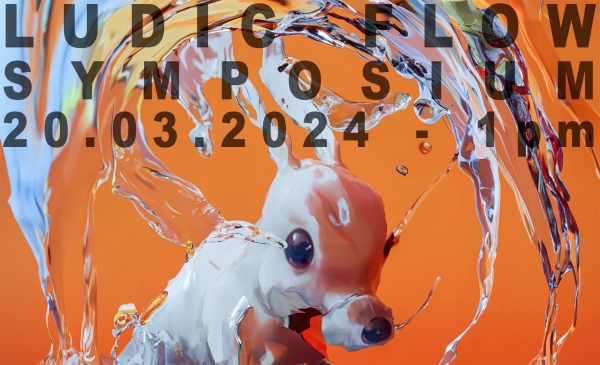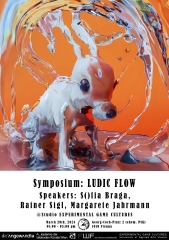In a technophilosophical approach a new research question of a particular Ludic
Flow is introduced. In an interdisciplinary team of arts, philosophy, and sciences we propose that Game Art is ideally suited
for providing a platform for investigating the possible role and relevance of technologies and play for society and politics
of Flow. The theoretical framing of the topic of LUDIC FLOW stems from the concept of Flow as motivation design, taken
up frequently and exploited heavily in game design and gamification.
In this symposium we aim to discuss a new form of
Ludic Flow in artistic research, in a more direct use of a flow state of mind in performative plays. The measurement and analysis
of play in Flow serves as the core game design principle of all artistic research experiments and games presented. Through
critical game studies discourse we will show how these variables can be used and combined in order to develop public formats.
We will delve into the ways in which experimental games, framed as means to a more viable future of play based on a playable
future in mind. This means that the relationship between play and world through technology and Ludic state machines can also
be a thought-provoking area of experimental systems. (Jahrmann)
This symposium is part of the LUDIC METHOD lecture
series/book project. It is an emanation of the newly launched research project The Psycho-Ludic Approach: Exploring play for
a viable future (FWF/PEEK/ AR 787).
Event FLOW:- Core to this event will be
the application of the creative Flow principle in game mechanics that aim to trigger a state of mind, which is thought to
be ideal for creativity since the 1960ies, but needs a change since its exploitation in the neoliberal world of winning and
the use of play as tool. In a Psycho-ludic Approach research we will measure the state of mind of lecturers in FLOW as a ludic
experiment.
- The finale of this symposium will merge into a Flow Game Salon, in which we will open up to
discuss FLOW and its mechanics in real-world instructions.
Speakers & Topics:Start time: 13:00, Studio Experimental Game Cultures, Georg -Coch Platz 2, 1010 Wien.
Welcome by
Univ.-Prof. Dr. Margarete Jahrmann, head of Department Experimental Game Cultures at at University of Applied Arts Vienna.S()fia Braga: Conjuring Counter-Realities – Social Media disruption, Online Trends and New Technologies
to create speculative fabulations
Rainer Sigl & Margarete Jahrmann: Let's Play: From Kinetic
to Frantic Flow
Flow Games Salon* * *
Margarete Jahrmann: WelcomeThe measurement and analysis of Flow games serve as core game design principles of all artistic research experiments in
the ZKF. Through critical techno philosophical discourse and applied game FLOW elements we aim to show how these variables
can be used and combined in order to develop public formats.
S()fia Braga: Conjuring Counter-Realities
– Social Media disruption, Online Trends and New Technologies to create speculative fabulationsIn her presentation
transmedia artist S()fia Braga delves into her artistic practice and research, tracing the evolution of her work from past
projects focused on social media disruption and interveillance to recent pieces that leverage new technologies and online
trends to create speculative fabulations. Through a lens of Flow theory, S()fia will examine how these pieces either enhance
or disrupt the experience of flow for both the artist and viewers.
Rainer Sigl & Margarete Jahrmann:
Let's Play: From Kinetic to Frantic FlowSeveral games will be used to reflect on the concept of FLOW and its
application in the games industry. In a critical discourse between Margarete Jahrmann and Rainer Sigl, potentials and dark
patterns will be explored and discussed.
* * *
More:
S()fia Braga is an Italian transmedia
artist and director based in Vienna, conducting artistic research that combines digital and post-digital practices. Her work
is focused on exploring new technologies and Internet trends to create speculative fabulations that delve into themes such
as transhumanism, human and non-human collaboration, and non-human agency. Moreover, S()fia’s work investigates the concept
of “Interveillance,” shedding light on the hidden power dynamics enabled by centralised social media platforms’ operational
structures and their sociological implications.
S()fia’s identity constantly changes and goes hand in hand with
the narratives she creates: over the last years she has been an artist, a transhumanist entrepreneur, an AI auteur, a cyberstalker,
a TikToker, and has mutated several times into a monstrous creature.
Over the past two years she has been awarded
the Kunstförderpreise der Stadt Linz (UNESCO city of Media Art) for the New Media Art category (2022), the Startstipendium
für Medienkunst by the Austrian Federal Ministry for Art and Culture (2023), the Content Vienna Award (2023) and the Bank
Austria Studios award (2022). Her works have been exhibited at Ars Electronica Festival (AT), Xie Zilong Photography Museum
(CN), XII Video Vortex Conference (MT), WRO Media Art Biennale (PL), Deutsche Bank (IT), Schlossmuseum Linz (AT), Pinacoteca
Albertina di Torino (IT) and more.
Rainer Sigl has been covering video games culture for nearly
two decades for a variety of Austrian, German and international media, among them Der Spiegel, Der Standard, WASD and Austrian
public broadcaster FM4.
Prof. Dr.
Margarete Jahrmann, is head of Experimental Game Cultures at
the University of Applied Arts Vienna. She is principal investigator of the art-based research project NEUROMATIC GAME ART
(FWF/PEEK AR581, 2021–23) at the University of Applied Arts Vienna and the PSYCHOLUDIC APPROACH (FWF/PEEK AR787, 2023–25).
Jahrmann is an internationally renowned artist and pioneer of game art. She co-founded the Ludic Society 2006 ad part of her
artistic PhD. She was professor for the artistic PhD program at the Universits of Appled arts VIENNA 2019- 2021. She also
was professor for Game Design at the Zurich University of the Arts 2006 – 2021 and before this co-head of the digital arts
department at the Zurich University of the Arts from 2000 on. In her collaborative and interdisciplinary artistic practice,
she explores ludic art and activism. She creates hybrid performative and installative works dealing with game cultures, neuroscientific
research and, emerging technologies — with the aim to introduce game changer games. Her work can be found in the Computerspielemuseum
Berlin, ZKM Karlsruhe, Ars Electronica and her exemplary art- game-art work will launch the new digital collection of TMW,
technical museum Vienna in 2023.
http://www.margaretejahrmann.net,
research:
https://neuromatic.uni-ak.ac.at




